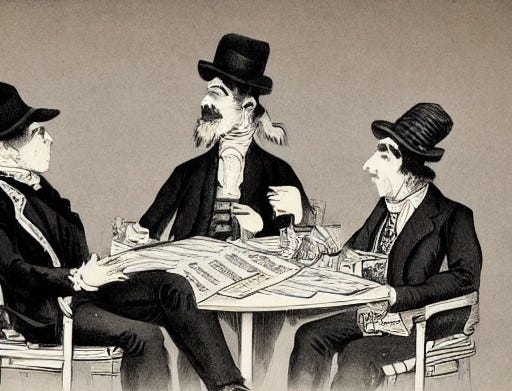Hello!
Maxel isn’t my real name, but please let’s go with that for now.
I have worked as a corporate financial advisor, director, and economist in the insurance industry from the world’s dominant financial centers for nearly 30 years. My clients have included the executive managers, board members, and other shareholders of many of the largest insurance groups and multinational corporations. I have raised capital as an investment banker for insurance carriers and others in the public and private markets, including in New York and several other US states, Bermuda, London, Guernsey, Dublin, Malta, Munich, Zurich, Tokyo, Beijing, Shanghai, Shenzhen, Singapore, and Hong Kong. I have advised the managers of small family offices and massive pension funds alike on their investments in insurance carriers and other assets. I humbly submit that there are few others out there that have the breadth and depth of experience and expertise in the global non-life (property & casualty) insurance industry. Life and health insurance involves a much simpler set of products and principles, so I’m no slouch there either.
In fact, insurance in principle is extremely simple; it only becomes excessively complex when the profit motive is introduced. While I personally find the complexity interesting, the insurance industry’s technocratic façade and bureaucracy, intended primarily to deceive and break contracts with customers, deserves and indeed lends itself to ridicule.
None find it more absurd than the insiders, few if any of whom set out for a career in insurance! It seems many of us found ourselves here, mid-career, wondering what went wrong.
I hope to expand the insider circle with this newsletter and subsequent work—to bring more in on the joke that is modern insurance and swell the ranks of reformists.
The publication of this newsletter will mark the end my financially and generally morally rewarding career in the sector (thus the pseudonym for now). It’s really a marvel I’ve lasted this long: as an outspoken working-class upstart with a visceral dislike for bullies and injustice, and lacking the pedigree or connections required for the highest levels of success, I have risen in spite of earning the ire of powerful crooks and fools along the way. I have also encountered many amazing, lovely, warm people.
With this newsletter, I hope to join with all of you to elevate my hobby of thwarting financial crime and incompetence to a full-time endeavor, ultimately working to reverse much of the inequality and inefficiency of insurance administered for profit at the expense of society and championing a return to widespread networks of mutually beneficial assurance.
So, why “Antiselection”?
The term is usually defined from the insurance industry's perspective as the problem of insurance buyers paying less than "full cost" for their coverage because of the aphorism that those who expect they may be at risk of loss are more likely to buy insurance. As an example of this, you may have heard the tired and apocryphal (or, at least, antiquated) anecdote about the heavy smoker buying life insurance at the lower cost non-smokers would pay.
As selling insurance to those who need it may hurt profits, insurance corporations are at pains at the selling point (aka underwriting) to avoid anti-selection (i.e. select) by identifying applicants’ idiosyncratic risk factors. If they appropriately measure and price according to the factors’ impact on future loss costs, insurers can theoretically avoid pricing out those who don’t need insurance (the target customer) while continuing to bilk those who may be more likely to use it. *Pro tip: you don’t need most insurance products on offer, even those nominally required by law - more on that in a later note.* All of this “selection” runs counter to the theory of insurance and is thus wasteful. It moves the true focus of insurance to money making and away from risk mitigation, sustainability, resilience, and the public good.
Identified risk factors will of course vary based on the type of insurance. They also vary in terms of controversy. Staying with the smoker example, it has become generally accepted that exposure to tobacco smoke contributes to lung cancer and other diseases that are expensive to treat and drive early mortality (disclosure: my father died of lung cancer attributed to a 50-year habit of burning through at least one pack of unfiltered Lucky Strikes daily). In the case of life and health insurance, because earlier mortality and/or higher health care costs = less profit for shareholders and lower bonuses for executives, admitted past-smokers will pay more or be completely denied coverage if possible. Many other factors, such as age, sex, and credit scores, are more contentious. Use of sex and credit scores in insurance pricing (such as auto / motor), for example, has been forbidden by (a very few) regulators due to these factors’ arguably spurious relationship with risk and their (inarguably) blatantly discriminatory nature. Importantly, many such metrics not only exacerbate socio-economic inequalities, but also run counter to the theory and fundamental purposes of insurance.
Once an important mechanism for mitigating individual and social risks, insurance administered for profit has instead become a tool for large capital owners to use other people’s money (OPM) to speculate, defer and avoid critical infrastructure investment and other social costs, extract short-term gains, commoditize lives and public goods, and game the real economy. This is by definition anti-selection, an act of violence, carried out by the corporate bureaucracies funded by the customers / victims themselves. This is one of the three primary reasons insurance sucks - it doesn’t work for anyone who actually needs it and is instead simply a tax on individuals and society.
In the days and weeks to come, I will outline a modest proposal for a return to mutuality and fiduciary responsibility as I document here other reasons insurance sucks, including the waste, fraud, and absurdities to which I have been witness over the last twenty-five years as an economist, advisor, and director in the global for-profit insurance industry.
I hope you will join and help us put the insurance cartels out of business.
Next topic: Lloyd’s coffeehouse gamblers vs. Swiss villagers.
The above image of coffeehouse gamblers was generated by a large language model (aka A.I.)



